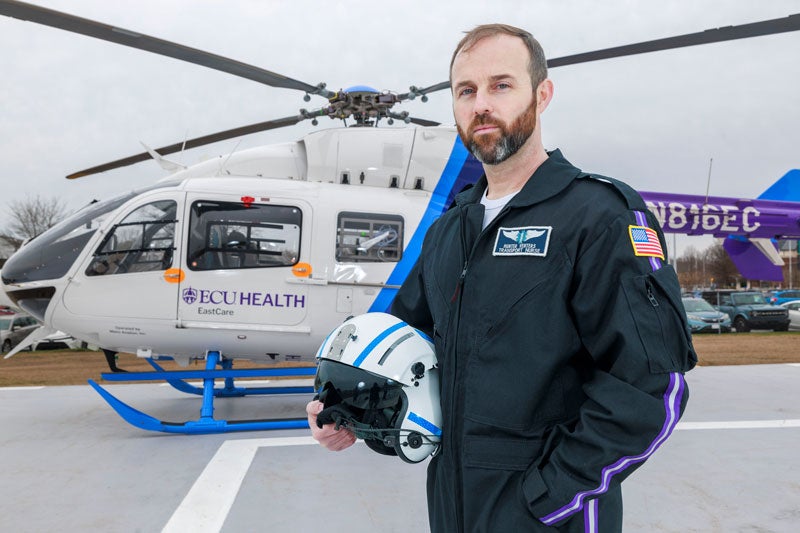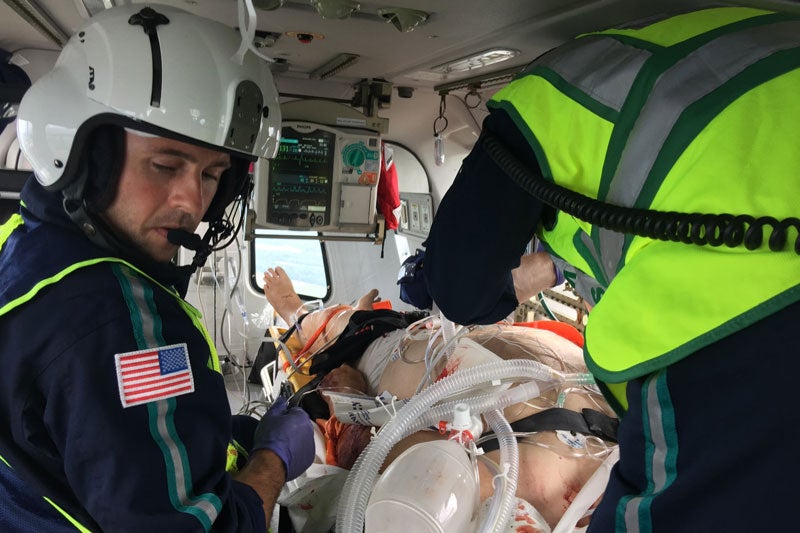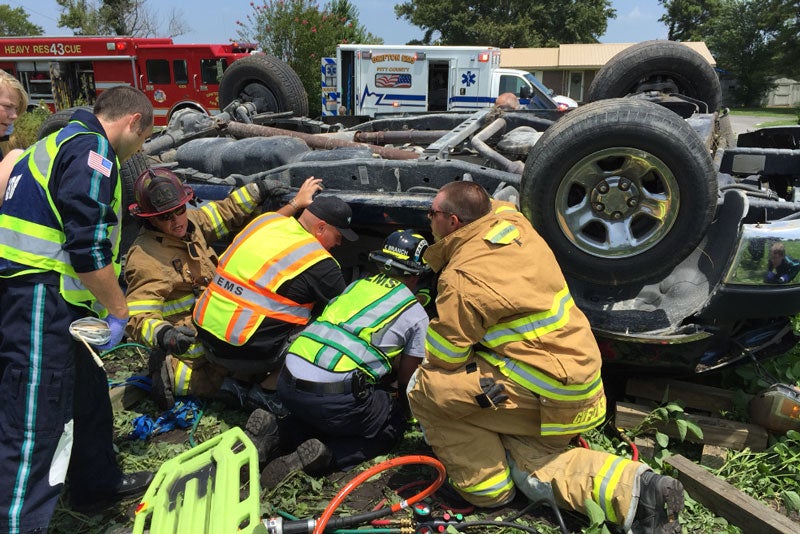Pirate Nurse takes flight over eastern NC to save lives
As a boy, Hunter Venters walked the fields of his family’s farms near Chicod in southern Pitt County. From time-to-time small planes would fly overhead. Venters doesn’t remember wanting to be in those planes, but now he can’t remember a time when he didn’t fly over Pirate Nation.
Venters always knew he would attend East Carolina University after graduating from D.H. Conley High School, and that he would be a nurse. He thought at the time that he could work a few days a week and still help on the farm, but soon recognized that a nurse’s life was too taxing to split his time between the hospital and the fields.

For years Hunter Venters, a native of Pitt County and ECU College of Nursing graduate, cared for the most critical patients as a flight nurse. Now he oversees the air and ground ambulances at ECU Health, with a coverage area from I-95 to the coast and from the Virginia border to the low country of South Carolina.
“I thought it was a good option. Community and job security was there, and I like learning new things,” Venters said. “That’s my jam even today. I’m always picking a topic and fully immersing into it and nursing is one of those things that allows you to do that.”
Venters met his wife, Ashley, in nursing school. She works for ECU Health as a family nurse practitioner in Kinston, and they share two daughters and a son, whom they take to ECU football games in between gymnastics and soccer practice.
After graduation in 2007, Venters went to work at the ICU at the medical center in New Bern in the cardiac unit before transitioning to caring for surgery and trauma patients at ECU Health Medical Center in Greenville.
“I transitioned here to our surgery and trauma ICU, and that’s like where I really fell in love with nursing because the patient acuity is just outstanding there,” Venters said.
Caring for the sickest of the sick patients in eastern North Carolina sparked a fire in him to make a decision. Would he pursue more training to be a Certified Registered Nurse Anesthetist or be a family nurse practitioner? What would his next professional step be?
“Every day I’d see my patients land on the rooftop and come in to me. Then I thought, man, flight nursing looks cool,” Venters said.
Becoming a medical team member of an air ambulance was no easy task. Venters applied for a vacancy with ECU Health EastCare Transport Services, ECU Health’s critical care air and ground transportation service, in Greenville and had to submit to physical and psychological testing before running through clinical scenarios and intense interviews with EastCare’s leadership.
“EastCare is more like a tryout. You come down for a first round of interviews. You meet the team, you meet our leadership and if you get invited back to round two, it’s a clinical scenario with the medical directors and clinical managers, which is now me,” Venters said. “Now and then we have written tests and personality tests.”

Hunter Venters cares for a severely injured person in the back of an air ambulance over eastern North Carolina. (Contributed photo)
Passing the initial interview process is just a way of getting your foot in the door, Venters said. There is a daily emphasis on fitness and competence and annual reevaluations: a timed half-mile run, lifting a stretcher with a 200-pound mannequin and pushing that same ‘patient’ across a grass field fully kitted out.
“We also do survival training annually. In the event of a crash you have to be able to take care of yourself, so we take our crews out and ensure they can build a fire and shelter,” Venters said.
Being the source of comfort and care for terrified and tremendously sick patients is physically, mentally and professionally taxing. As a registered nurse, Venters and his peers were responsible for medical procedures most of his peers aren’t qualified to perform – needle decompressions, airway access through a patient’s throat and delivering medicines and fluids into the bone: extreme medicine practiced in a blacked-out jumble hundreds of feet above eastern North Carolina.
“You’re on a flying machine interacting with the pilot. You have seven different channels going on in your headset and talking to your partner about the patient. The pilot is talking about what’s going on with the aircraft and you’re listening to other pilots in the area, so you don’t crash and run into each other,” Venters remembers.
Being a male in the nursing profession has been a unique challenge. He was one of nine men to graduate in a class of 100.
“We had a lot of older men in my class. Probably five of the nine were over age 40 and they were using their Bill or changing careers and said, ‘Nursing looks great, let’s try this out,’” Venters recalled.
After a few rewarding years in the back of the helicopter, and then in a management role overseeing a fleet of air and ground ambulances, Venters went back to school and is now a family nurse practitioner. One day he may see patients in a primary care role, but for now he’s happy to oversee a network of air ambulances that covers an enormous swath of farm fields and a swampy coastline from the Virginia to South Carolina and I-95 to the Outer Banks.

Hunter Venters (left) responds to a vehicle accident during his time as an active flight nurse. (Contributed photo.)
Trey Labrecque, director of EastCare, praised Venters for setting the example for what a flight nurse should be and that his experience and education helps to develop the next generation of flight nurses for eastern North Carolina.
“Hunter’s ability to take an inexperienced nurse in critical care transport and mold them into an outstanding critical care flight nurse is tremendously valuable to our team and the patients we serve,” Labrecque said.
Venters credits his time at ECU’s College of Nursing with honing his critical thinking and leadership skills.
“I remember doing clinicals in the hospital with other community college students and thinking they were focusing more on technical skill,” Venters remembered. “At ECU the education was more theoretical and leadership driven, and I didn’t really appreciate that until my second year of nursing school because then I was thinking at a different level. ECU sets you up early for success; how to work through challenges.”
Venters said Pitt County is his home and he loves everything about it – his family is here, the hunting and fishing and being outdoors. And it didn’t hurt that one of the best nursing schools in the nation was in his back yard.
“I didn’t really have any inclination to leave. Where else would I go than right here at ECU?”